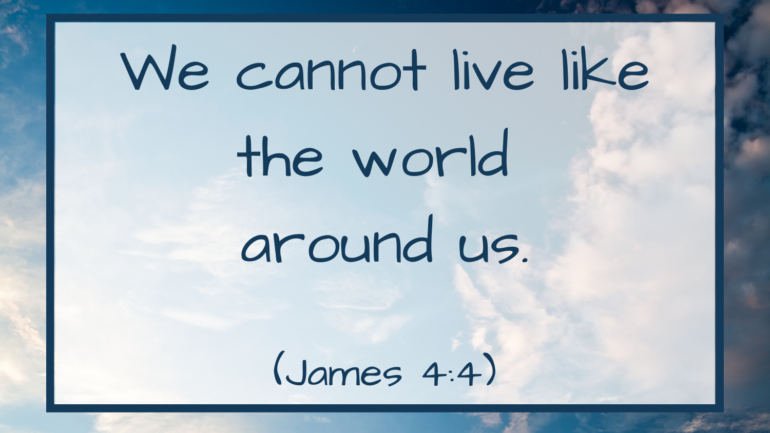God’s goodness is our standard and the source of all that is good in our lives. He expects us to be good as well, by living a good life and doing good to others.
The way we use it, the word good is a relative term. I think that grits are good, but my husband strongly disagrees. A friend that I should watch one of the new Star Wars movies because it is so good, but I couldn’t even finish it. We call something good if we like it or if it pleases us. So, what’s good to you may not be good to me, and vice versa. In the world’s use of the word, there is no standard of goodness.
When it comes to discussing what food we like or our movie preferences, it’s ok that there’s no standard. It’s ok to like different things. But what about when it comes to discussing lifestyle or behaviors? As we see all around us, there’s a problem when there’s no standard of good or right behavior.
The Standard of Goodness
As Christians we know that there is actually a standard of goodness when it comes to how we live our lives. God is that standard. He defines goodness because He is good. We read in 1 Chronicles 16:34 that we are to give thanks to God because He is good. In Mark 10:18, Jesus says that God is the only one that is good. So as the only good being, He certainly has the right to determine what is good. Hayley DiMarco, in her book The Fruitful Wife, says it this way:
If God is good, and everything He does is good, and He does what He pleases, then we can conclude that what pleases God is goodness…therefore, goodness can be defined as anything pleasing to God.
Instead of thinking of what’s good as what’s pleasing to us, we must think of what’s good as what’s pleasing to God. That’s our standard.
The Source of all Goodness
God’s Goodness in Creation
Not only is God the standard of what’s good, He’s also the source of everything that is good. James 1:17 says that every good and perfect gift comes down from our Father above. God’s good gifts to His people began with creation. We read in Genesis 1 that everything God created was good. And not just good, but very good. It was enough that God gave us life and place to live, but He went above and beyond.
God didn’t give us a mediocre world to live in; He gave us a good one, full of beauty and abundance. God didn’t just give us food to sustain us; He gave us a rich variety of delicious food. God didn’t just create a bird and a flower; He created thousands of species of birds, many of them gorgeous. He created hundreds of thousands of beautiful, fragrant flowers. Why bother with all the variety and beauty? Because He’s good.
God’s Goodness to His Children
God’s goodness doesn’t stop with creation. Jen Wilkin defines God’s goodness as His “utter benevolence, the complete absence of malice.” We said before that God does what He pleases. It pleases God to do good for us. He wants to do good things for His children. I love giving gifts to my kids. I probably love it too much, considering how much stuff they have, but it pleases me to make them happy. God is no different. He is our Father. It pleases Him to make His children happy by giving us good gifts.
This may sound silly, but there have been several times when I’ve been shopping and found the exact thing that I was looking for, even though it was something that would seem hard to find. For instance, I collect a certain pattern of glassware. I had found a pitcher in this pattern and small juice glasses, but I wanted the larger tea glasses. I found them online, but they were expensive. But then one day, my mother-in-law and I went to an estate sale, and what do you think I found? Not just one glass, but 12. And I paid maybe a quarter a piece for them. In my mind, that was God giving me a gift. That may sound weird to you, but I think God delights in doing things like that.
That is a frivolous example. God’s gifts include more practical things, like food, a home, money to pay the bills, family, etc. It also includes spiritual blessings, such as salvation, peace, joy, and so on. Quoting Jen Wilkin again, “We experience God’s goodness in a thousand every day graces.” So, if every good gift is from God, then everything that is good in our lives can be traced back to Him. So, it’s ok to consider that perfect shopping find as a gift from God, along with every other pleasant thing in your life.
Doubting God Goodness
It’s All in How You Look at It
Have you ever seen one of those images where what you see depends on how you look at it? Maybe you’ve seen the one that either looks like an ugly old woman or a pretty young girl. The way people view God is kind of like that. We all have a worldview, or a set of beliefs and preconceived notions that affect the way we see things, even God. It’s like we’re all looking through the world through different lenses, so we all see things a little differently.
As Christians, we should view the world through the lens of Scripture. So, we focus on the positive, seeing evidence all around us of God’s goodness. However, unbelievers are looking through a different lens. Rather than focusing on the positive, many of them look at all the negative, the bad things that happen and the evil in the world, and they see that as evidence that God must not be good.
I wrote a blog post some time ago about evidence for God’s existence, and I shared it on Pinterest. I had a complete stranger leave this comment on my pin, “There’s a lot of evidence for evolution, and if we do have a creator, he’s not a good loving god.” Why would he say that? Like so many others, he’s probably thinking, “How could a good loving God let so many bad things happen?”
They Don’t Know What They’re Saying
I don’t think those people realize what they are saying. What would God have to do to remove all evil from the world? One idea is just to remove all the evil-doers, get rid of the bad people. What’s wrong with that idea? We’re all evil-doers. Now these unbelievers would argue with me, saying that they aren’t evil. They’re talking about the murderers, the rapists, the really bad people. If we just got rid of those people the world would be a better place. But the truth is, bad things would still happen because all people are bad. There would still be lying and cheating and stealing, etc. The only way to get rid of all the badness is get rid of all the people.
What if God just stopped people from doing bad things? That would take care of the problem of evil. What’s wrong with that idea? If God chose to not allow people to sin, then we would lose our freedom to make choices and we’d basically become robots. I don’t think that the people who question God’s goodness would really want Him to take away their ability to make choices, so that’s not going to work either.
The truth is, those who reject God because they deny His goodness are actually blinded to the truth. They can’t see God’s goodness, because they don’t have the Spirit. Paul writes in 1 Corinthians 2:14, “The natural person does not accept the things of the Spirit of God, for they are folly to him, and he is not able to understand them because they are spiritually discerned.”
Implications of God’s Goodness
We don’t have to be afraid of God.
If we were focus only on certain aspects of God’s character, we might live in fear that He would strike us down. God’s justice, as seen in the Bible, is terrifying. Knowing that God knows everything I’ve ever done and sees all that I do now is frightening. However, God’s goodness reassures us that, which He is just, He’s not harsh or cruel. He has compassion and mercy on us even in spite of our sinfulness. His goodness means that we can “with confidence draw near to the throne of grace, that we may receive mercy and find grace to help in time of need” (Hebrews 4:16).
We should be thankful for all the good things God has given us.
As we’ve already said, everything we have is a gift from God. He is the source of all that is good in our lives. We tend to forget that or take it for granted because God’s goodness is so constant in our lives. He pours out blessings upon us day after day with abundance. We’re aware of the big gifts…life, family, food, etc. But we should develop a lens of gratitude, so that we are more aware of those little gifts that God delights to give us, such as glasses at an estate sale.
We should desire to be good.
We said earlier that goodness is whatever is pleasing to God. That’s kind of broad biblical definition. What does that look like in practice? Well, the word goodness can mean living in an upright, honorable way. Our thoughts, words, behavior should all be pleasing to God, so we must seek to live according to His Word.
Goodness also includes saying and doing things that cause other people to be happy, or things that are helpful to other people. George W. Bethune, a pastor in the 1800s, said it this way:
The best practical definition of goodness is given in the life and character of Jesus Christ: ‘Jesus of Nazareth who went about doing good.’ [Acts 10:38]. So far as we resemble Jesus, in his devotion to the welfare of men, do we possess the grace of goodness.
God has been so good and so generous to us, that we have no excuse not to share that goodness with others. We should do what we can to alleviate the suffering of others and help improve their lives, wherever possible. As Jen Wilkin says, “Those who know good awaits them in heaven can afford to be generous on earth.”
The information in this post was based on the following resources:
In His Image: 10 Ways God Calls Us to Reflect His Character by Jen Wilkin
The Attributes of God by Arthur W. Pink
The Fruitful Wife by Hayley DiMarco
The Fruitful Life by Jerry Bridges
Unless otherwise noted, Scripture quotations are from The ESV® Bible (The Holy Bible, English Standard Version®), copyright © 2001 by Crossway, a publishing ministry of Good News Publishers. Used by permission. All rights reserved.






Seeking God's Face: Discovering the God of the Bible - She Lives Worthy %
[…] The Implications of God’s Goodness (blog post) […]